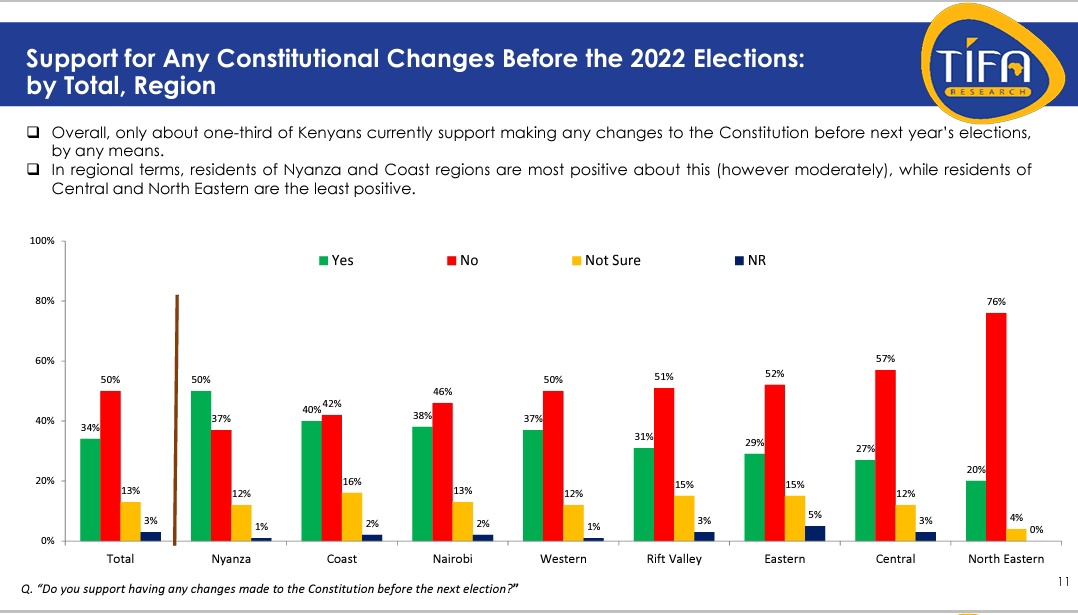TIFA poll: BBI popularity drops as many Kenyans say referendum is unlikely to happen

The percentage of Kenyans supporting the Building Bridges Initiative (BB) has dropped significantly even as the hearing of its appeal enters day 3 at the Court of Appeal, findings by Trends and Insights For Africa (TIFA) indicates.
The TIFA survey was conducted between June 24th and June 28th 2021.
According to a survey done by TIFA that involved 1500 respondents, 34 per cent of Kenyans support the BBI. This represents a drop of 8 per cent given that a similar survey recorded 42 per cent support in December last year.
The number of those opposing the BBI shot to 50 per cent from 46 per cent recorded in December.
On voting patterns, 19 per cent of those who were interviewed said they will vote for the BBI if a referendum is held.
The new figures represent a drop of 10 per cent from the last findings done in December 2020 that indicated that the BBI referendum would have been passed by 29 per cent of Kenyans.
Huge percentage of those who will pass the BBB referendum are ODM supporters (59 per cent) followed by Jubilee (25 per cent) and UDA recorded 9 per cent.
At the same time, 32 per cent of the respondents said they will not pass the BBI referendum if held.
This finding represents a one per cent increase from the previous findings that established that 31 per cent of Kenyans will vote no for the BBI referendum.
57 per cent of UDA supporter opposed the BBI referendum, followed by Jubilee (31 per cent) and ODM recorded 13 per cent of the respondents.
On the other hand, the number of Kenyans who said they will not participate in the BBI referendum dropped from 26 per cent recorded in December last year to 18 per cent.
The TIFA survey also queried respondents on the possibility of having the BBI referendum following its nullification by the High Court of Kenya on May 4.
A huge percentage of the respondent expressed huge doubt on the possibility of having the BBI referendum before the next polls.
34 per cent of the respondents said the probability of having BBI referendum is not likely at all as 20 per cent noted that they are not sure about it.
Only eight per cent of the respondents said they are certain of having the referendum before the next General Elections. 12 per cent said its very likely,14 per cent somewhat likely, 12 per cent only a little.
On reasons why they think BBI referendum will not be held before the next polls, 29 per cent of the respondents cited the ongoing judicial processes, 12 said due to lack of time before the 2022 polls and 8 per cent cited insufficient funds.
Two per cent cited disagreement among leaders, one per cent blamed Covid and a similar number faulted violence and tension.
Overall, a clear plurality of Kenyans (43 per cent) perceives the main motivation behind the push for the BBI reforms as related to efforts to influence the outcome of the next election.
At the same time, a sizable minority (25 per cent) consider it to be an undertaking of both politicians and citizens aimed at addressing certain problems the country is facing.
Rather fewer (15 per cent) consider it an effort by citizens themselves to do this, with a similar proportion (15 per cent) being uncertain about what really is motivating this effort.
The findings of the research were obtained before the Court of Appeal began to hear the case challenging the judgment of the High Court that declared the entire BBI process intended to lead to a national referendum to approve or reject the proposals contained in the Constitution of Kenya Amendment bill of 2021 unconstitutional null and void.








